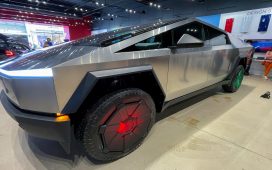Eventually, GMC dealers who get into the EV business would get more battery-powered vehicles to sell, including a Hummer SUV and a full-size pickup, according to an investor presentation by executives last week.
GM currently has just one EV in the U.S., the Chevrolet Bolt, but it intends to offer at least 20 EV models in North America and 30 globally by 2025. The company has committed $27 billion toward battery-powered and autonomous vehicles over that period, so much of its bottom line will depend on dealers selling EVs at the volumes GM anticipates.
GMC’s EV agreement gives the factory more oversight of the digital retailing process than automakers traditionally have had. Dealers who sign it must authorize GM to process online deposits on their behalf and take “any other reasonable, necessary steps” to fulfill the vehicle reservation.
The dealership will still be identified as the merchant on the customer’s billing statement, the agreement says.
But the contract restricts dealers from using customer information generated from the reservation for anything beyond that one transaction. The information can be used “solely for the purposes of completing purchase of the reserved vehicle and for no other purpose,” the agreement says.
Such a restriction could stop dealers from contacting customers for service and future sales, lawyers and state franchised dealer associations said.
“We’re giving away a ton of our control to them,” said the GMC dealer who spoke with Automotive News. “It’s like they’re saying, ‘It’s not your customer. It’s our customer.’ ”
Dealers also are prohibited from responding to reservation requests with automated messages, the agreement says. All communication must be manual. Most dealers use automation — in the form of mailers, emails and prerecorded messages — to market to customers.
Aldred, Reuss and CEO Mary Barra have said that GMC will use no-haggle pricing for the Hummer, which would eliminate one part of the buying process that many customers detest.
“There will be no incentives. There will be no trickery,” Aldred said on an October call with investors. “We are trying to construct a dealer margin in such a fashion that it really is a no-haggle price.”
Dealers will receive a set margin as part of the no-haggle plan, Aldred said.
The participation agreement doesn’t specifically allow for unilateral pricing, however. It says customers reserve the vehicle with GMC at sticker price, but the final price is negotiated with the dealership at the time of sale.
GM expects the initial low-volume Hummer to be in high demand, and the automaker wants to deter dealers from gouging Hummer buyers, which could hurt customer satisfaction and push customers away from the automaker in the future, said Len Bellavia, founding partner of Bellavia Blatt law firm in Mineola, N.Y.
If GMC provides dealers with a reasonable gross profit per vehicle under a no-haggle model, dealers might go along with it, Bellavia said, “unless they feel it’s a precursor of something worse to come down the line. You always have to think about whether this is setting bad precedent.”








